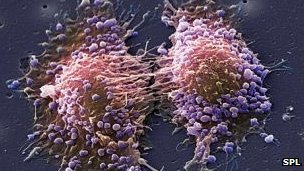A new technique to treat early prostate cancer may have far fewer side-effects than existing therapies, say experts.
A 41-patient study in the journal Lancet Oncology suggests targeted ultrasound treatment could reduce the risk of impotence and incontinence.
Researchers say it could transform future treatment if the findings are repeated in larger studies.
The Medical Research Council (MRC), which funded the study, welcomed the results, which it said were promising.
Each year 37,000 men in the UK are diagnosed with prostate cancer. Many face a difficult dilemma: the disease kills about 10,000 men every year, but for some it may not get worse if left untreated.
Standard treatment with surgery or radiotherapy involves treating the whole prostate gland, and can harm surrounding tissue, with a serious risk of side-effects, including urinary incontinence and impotence.
Targeted Treatment
Doctors at University College Hospital in London have carried out the first trial using high-intensity focused ultrasound (HIFU) aimed at small patches of cancer cells on the prostate.
This was a “proof of concept” study involving 41 patients.
They used a probe, placed close to the prostate, which emits sound waves that heat the targeted cells to 80C, while causing minimal damage to surrounding nerves and muscles.
Hashim Ahmed, a urological surgeon at the trust who led the study, says the results, 12 months after treatment, are very encouraging.
“We’ve shown in this study that focal therapy – by targeting the individual areas of cancer – can avoid the collateral damage. We’ve shown that nine in 10 men had no impotence and none of the men in the study had incontinence of urine.”
Mr Ahmed says the early evidence on cancer control is also very good. But he says this needs to be evaluated in much larger studies.
“This could offer a transformation of the way we treat prostate cancer. It could offer a cost-effective treatment for the NHS, and offer men with early prostate cancer an opportunity to treat their disease, but with very few side-effects.”
A patient on the trial, 72-year-old Robert Page, from Croydon, says his treatment, two years ago, was a great success.
“The outcome was very good,” he said. “I was very pleased with the treatment and very happy with the lack of side-effects, particularly when I contrast that with what might have been the case if I’d had one of the other, alternative, treatments.”
The study was funded by the Medical Research Council, the Pelican Cancer Foundation and St Peter’s Trust.
Further Trials
Professor Gillies McKenna, director of the Gray Institute for Radiation Oncology and Biology, a joint collaboration between the MRC and Cancer Research UK, welcomed the findings.
“If these promising results can be confirmed in a randomised controlled trial, focal therapy could soon become a reasonable treatment choice for prostate cancer alongside other proven effective therapies.”
The chief executive of the Prostate Cancer Charity, Owen Sharp, also emphasised the importance of further research.
“We welcome the development of any prostate-cancer treatment which limits the possibility of damaging side-effects, such as incontinence and impotence. These early results certainly indicate that focal HIFU has the potential to achieve this in the future. However, we need to remember that this treatment was given to fewer than 50 men, without follow-up over a sustained period of time. We look forward to the results of further trials, which we hope will provide a clearer idea of whether this treatment can control cancer in the long term whilst ridding men of the fear that treating their cancer might mean losing their quality of life.”
Are you receiving prostate cancer treatment? What do you think about the new technique? Please send us your comments and experiences. Please note, the BBC cannot pass contact details to the research group.
Source: BBC News UK





